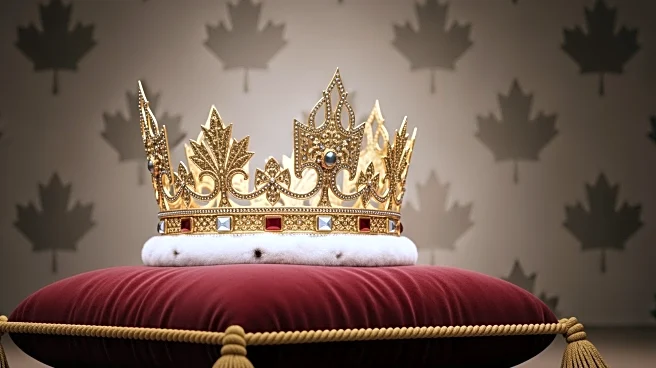What's Happening?
Prince Harry, the Duke of Sussex, recently issued an apology to Canadians after being seen wearing a Los Angeles Dodgers baseball cap during Game 4 of the World Series. The game, held on October 28 at
Dodger Stadium in Los Angeles, featured the Dodgers against the Toronto Blue Jays. The choice of cap sparked discontent among Canadian fans who expected Harry to support the Blue Jays. In an interview with CTV, a Canadian news channel, Harry humorously referred to the incident as 'Hat Gate' and explained that he was under duress, needing a cap due to the floodlights and his thinning hair. His apology was broadcast on Thursday, aiming to address the concerns of Canadian fans who felt slighted by his choice of headwear.
Why It's Important?
The incident highlights the sensitivity surrounding national sports allegiances, especially when involving public figures like Prince Harry. His choice to wear a Dodgers cap instead of a Blue Jays cap at a high-profile event like the World Series underscores the cultural significance of sports in national identity. For Canadians, the Blue Jays represent a major league team that carries national pride, and Harry's actions inadvertently touched on these sentiments. The apology serves to mend relations and acknowledges the importance of sports as a unifying factor in national identity. It also reflects the scrutiny public figures face regarding their actions and affiliations, especially in international contexts.
What's Next?
While Prince Harry's apology may have alleviated immediate tensions, it remains to be seen how Canadian fans will react in the long term. The incident could prompt public figures to be more mindful of their actions and affiliations, particularly in sports settings. It may also lead to discussions on the role of celebrities in sports diplomacy and their influence on international relations. As Harry continues his public engagements, he might face increased scrutiny regarding his choices, especially when they intersect with national pride and identity.
Beyond the Headlines
The 'Hat Gate' incident raises questions about the expectations placed on public figures to align with national sentiments, especially in sports. It also highlights the cultural significance of sports apparel as a symbol of allegiance and identity. This event could spark broader discussions on the role of sports in diplomacy and how public figures navigate these cultural landscapes. Additionally, it underscores the power of media in shaping public perception and the importance of addressing cultural sensitivities in international contexts.










